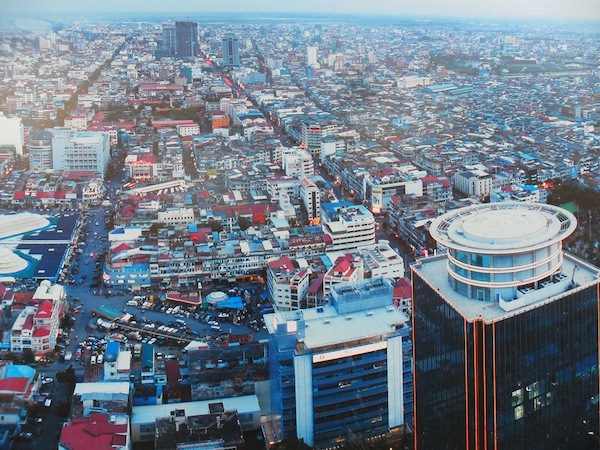The hope and promise that surrounded Phnom Penh’s property market in the mid-2000s was quick to evaporate with the arrival of the global financial crisis.
Landmark projects such as the centrally-located Gold Tower 42 and Camko City city, an ambitious satellite city in the Cambodian capital’s suburbs, came to a grinding halt (amid corruption allegations, bankruptcy and law suits) and construction of the latter only recently restarted. For those residential and commercial properties that were eventually completed, it has since been an uphill struggle to attract sufficient investment and occupancy.
There is, however, a supposed diamond in the rough situated on a slither of land only a stone’s throw from the city’s monolithic NagaWorld casino. Primarily bankrolled by Chinese money, the 250-acre, mixed-use Diamond Island development is rising, gradually.
Amongst unusual features such as a replica of the Arc de Triomphe and a highly improbable 555-floor skyscraper (if ever realised it would be one of the world’s tallest buildings), Diamond Island will include three 33-storey residential towers and an additional two 29-storey condominium tower.
But is Phnom Penh now at a stage where a development such as this is viable?
Hyundai Phnom Penh Tower and Canadia Tower, which both launched a few years ago, attracted sufficient interest—although some prominent tenants later relocated—and the award-winning Vattanac Capital Tower, billed as the country’s first grade-A office space will also court some reputable companies when it is eventually completed. To date, the reasonably priced units at the DeCastle condominium collection, have also been successful in attracting local middle-class and expat buyers, while judgement will soon be passed on the feasibility of the country’s first international-standard shopping centre, Aeon Mall, that opened its doors this week.
But the reality remains that there is simply not enough demand for luxury housing from the local market. Cambodia’s nouveau riche make up a negligible portion of the population and the middle-class, while growing, is still someway off being substantial enough to warrant the supply of all these new condo units.
I was therefore surprised to be informed by a sales agent at a recent property expo that the residential component of another newly-launched mixed-use project in the heart of the city is almost sold out. Furthermore, I was told that Singaporean buyers accounted for about 70 percent of all purchases.
My next question was why Singaporeans would want to buy property in Cambodia. Looking uncomfortable, she stammered and stumbled before eventually saying she’d get back to me.
Anybody who has spent time doing business in the Kingdom should be well versed on the main factors for overseas investment. Whether it’s coming from a government spokesperson, the slimy sales director of a local company or the country head of ADB, the pre-recorded-sounding response is usually the same:
“It’s a high-growth economy with a stable political environment and improving infrastructure…”
Maybe her lack of local knowledge is quite telling of why Singaporean buyers—if they really are—are investing in Cambodia.
Once the sales girl’s hackneyed pitch about ROI potential and it being the city’s most luxurious condo is overcome, are these self-titled savvy investors not bothering to ask why they should invest in a country they presumably know little about? Are they that desperate to throw money at something that they’ll resort to blindly placing down sizeable deposits on condos in a market that lacks demand, when all they have to go on is neon-adorned GCI graphics with firework displays and flocks of birds sketched on the sky for good measure? You’d think not, although the booth was one of the busiest at an otherwise quiet expo.
It’s true that Cambodia has recorded a steadily rising GDP for the best part of a decade and, depending on your interpretation of it, maintains political stability through Hun Sen’s iron fist. But with the condo market very much in its infancy and many of the new batch likely to be overpriced and untested, it might be worth revisiting Phnom Penh a little farther down the line.
Source: www.property-report.com

